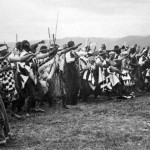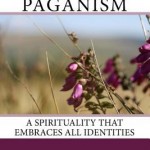Today, we welcome John W. Morehead, a researcher, writer, and speaker and advocate for positive Pagan-Christian interfaith dialogue. Recently I wrote to you all about the importance of intrafaith work in the Pagan movement to bring more understanding and better communication between traditions. But my wider inspiration for that is the kind of interfaith work that John speaks of so passionately here. Think Pagans and Evangelicals have nothing to say to each other? (Confused about what the difference is between an Evangelical and a fundamentalist Christian?) Read on…
Last week, I enjoyed a multi-religious conversation in a podcast that brought two Pagans together with two Evangelicals to respond to questions related to what divides and what might bring together our religious communities. I always come away encouraged from such interactions, but reading comments by Pagans to this conversation on a Pagan blog, I was all too quickly reminded of the uphill challenges and obstacles associated with such things. We have a long way to go, and perhaps some in our communities will never be able to make the journey with trust.
Recently, my colleague Paul Louis Metzger invited two Pagan friends and colleagues, Mike Stygal, soon to be President of the National Pagan Federation, and Jason Pitzl-Waters of The Wild Hunt blog, along with myself to be part of a conversation. The hour-long podcast went very well, and put forth the groundwork for more in-depth discussions in the near future concerning significant issues and challenges facing our religious communities. This included concerns Pagans have about Christians and proselytizing, Christian privilege in the public square, and what public context might be best for a Pagan voice such as secular or multi-faith. The ability to raise and respond to difficult questions was made possible by the trust that has developed among us over time as we have gotten to know each other, watched each other’s public work within and outside of our religious traditions, and through our engagement of each other in private and public forums. I think I can speak for all of us by saying that we came away from the discussion feeling good, and in hoping that members of our religious communities would find something of value, as well as challenge in our conversation.
Following the publishing of the podcast we began to promote it for listeners. One such promotion for the Pagan community came in the post by Jason in The Wild Hunt. I found Jason’s description and commentary on the podcast and its broader context of Pagans and interfaith dialogue both interesting and challenging. Jason’s humility shone through as he briefly mentioned his own contribution to the podcast and recent dialogue efforts, but then quickly highlighted the good work of many other Pagan examples in dialogue. It was heartening to see a mention of Pagans who have been involved in these activities, and I hope to cross paths with more of them in the near future. But in another way, Jason’s post was challenging, not in the post itself, but in many of the comments that came in response to it.
I spent my Sunday afternoon reading the comments and reflecting on what they meant for Pagan-Christian dialogue. Several responses indicated that many Pagans were just as distrustful of Evangelicals (even those who seemingly make every effort to engage positively as trustworthy conversation partners) as many Evangelicals are wary of Pagans. Some of these negative comments included questions about why Pagans should seek the approval of Christians through dialogue (a curious question in that this was never stated as a goal in the podcast), concerns that Evangelical involvement in dialogue was just a ruse for the conversion of Pagans, that Evangelicals have made no attempt at understanding Paganism, and that some of us “stealthier, newfangled evangelicals” have managed to dupe “some Big Name Pagans” through our dialogue efforts. I left a few comments in response to some of these concerns, and my hope is that even if those who left the original sentiments won’t be persuaded by my feedback, that perhaps other Pagan readers might find the responsive thoughts of interest in the name of balance.
Will we ever be able to move beyond our history of ignorance, misunderstanding, misrepresentation, bigotry, and combativeness? In my more pessimistic moments I doubt it, but then I am reminded that efforts at understanding each other through relationships and conversations are really in their infancy. Patience and a thick skin are in order. As a part of working through this division, I share the following observations and reflections for those Pagans willing to listen.
First, there are some Evangelicals who have honestly worked at pursuing a better way in understanding and engaging Pagans. While some continue to distrust us, we have reached into the best of the Christian tradition in order to put forward a new way of interreligious engagement as we try to follow the way of Jesus in his engagements with Gentiles and Samaritans as a model for our interactions with Pagans and those of other minority religions. This has meant seeking understanding in response to ignorance, and we have sought out the best representatives of Paganism and good source material, rather than relying upon problematic and alarmist material produced within Evangelicalism. We also view our Pagan contacts, not as monstrous “others,” but instead as fellow human beings sharing a planet burdened by violence and war, often fueled by religion. We have also developed relationships with Pagans in the form of genuine friendships that have value in and of themselves, not as pragmatic means to the end of evangelism. Although sharing the pathway of Jesus is part of the Christian DNA, just as sharing the essence of the religious message is an essential part of many religious traditions, nevertheless, I recognize that sharing our message with the hopes of persuasion is not the only element of interreligious interactions, and that if it is not welcomed by a dialogue partner and we persist then we quickly move into unethical territory of proselytizing. I have also taken the additional step of countering misinformation and the misrepresentation of Paganism, both within Evangelicalism as well as outside of it in the secular media.
These efforts have at times come at a cost within my religious community. Evangelicalism has a strong sense of its boundaries, of who is in and who is out, and a as a result at times I have become a concern to that group of self-appointed gatekeepers who police Evangelicalism’s borders. Some of my work on behalf of Pagans and other minority religions has drawn the criticism of these Evangelicals who view me as liberal, postmodern, a compromiser, perhaps even covertly Pagan. Such criticism is not always easy to bear, but I try to take it in stride. In my view being the focus of concern and criticism from some in my own religious community is worth the benefits that more positive forms of engagement between Christians and Pagans bring, and it also allows me to be involved in the peacemaking that Jesus called his followers to be involved in.
Second, it seems to be as if both Evangelicalism and Paganism face continuing challenges from the more conservative, if not fundamentalist elements of their religious communities. Although discussion of fundamentalism in regards to Christianity is familiar territory, it may seem strange to consider it in relation to Paganism. But consider the recent discussions of it within the Pagan community.
In January of this year Sabina Magliocco gave a presentation at the Conference for Contemporary Pagan Studies titled “The Rise of Pagan Fundamentalism.” As she describes in her guest post at The Wild Hunt, her goal for the presentation was “open discussion and critical self-reflection” among Pagans which she sees as necessary for the health of the movement. In her presentation and subsequent follow up discussion she provided clarification on what she meant by “Pagan fundamentalism.” As stated above, it may seem strange or inappropriate to apply a term that originally referred to a segment of Protestant Christianity in terms of its very literal interpretation of the biblical text, and practices of withdrawal and hostility toward culture and other religions, and then to try to apply this to Paganism. Magliocco is aware of this, and recognizes that even with a modification of the term, its application to Paganism is not without its difficulties. Magliocco also recognizes that the term continues to be used in ways that stigmatize others, but she defines it in part as an inflexible form of ideology that precludes questioning and which involves boundary-setting, and where those who disagree are labeled as enemies or heretics. In her discussion of the application of fundamentalism to Paganism, she recognizes that the term does not apply to many Pagans, but she also notes that there has been a lot of discussion among Pagans on the Internet in regards to “a single correct form of belief, and the demonization of those who hold different beliefs and opinions.”
Chas Clifton has also shared his thoughts on Pagan fundamentalism. In his view, once the label or the concept is applied toward others you have “declared that nothing those people say is worthwhile, that they have nothing to teach you, and that they should just sit down and shut up.” Magliocco’s and Clifton’s discussion of Pagan fundamentalism is in regards to internal disputes within the Pagan community, but having noted the context of recent conversations on this issue, I believe the term and discussion is useful, and that it relates not only to internal matters within Paganism, but also externally in terms of how the Pagan community chooses to posture itself in regards to interreligious engagement, particularly in the case of Pagan and Christian interactions.
In his fine book Fundamentalism and American Culture, George Marsden notes that Protestant fundamentalists have had an “anti-cultural bias.” This has also been a feature of segments of Protestant Evangelicalism, particularly in terms of responses to pluralism and the increasing profile of minority religions, especially Paganism and Islam. Evangelicals with fundamentalist tendencies have tended to view minority religions as evil, even monstrous, and with this has come mistrust and strict opposition seen as the only appropriate way forward. This fundamentalist strain within Evangelicalism can also be seen within aspects of Paganism.
In 2008, Witchvox featured an article by Jedi Gordy titled “Future of Paganism” which mentioned some troubling parallels between Christian fundamentalism and Paganism. Gordy wrote in part:
This article is on something most of us dislike: Christianity. But it is more on how modern Paganism is BECOMING much like Fundamentalist Christianity. We claim to be enlightened (which we should be to become the third degree). We claim to be tolerant. We claim to be righteous and pure. Then tell me this: Why do I hear so many of us slamming the “big three” (Judaism, Christianity, and Islam) and calling those who call us out on our hate-speak “Christians” or other names?
More recently I have observed Pagan fundamentalism in one form that relates to Christianity in terms of alarm-sounding and exposé. This is precisely the type of approach that Pagans have decried for years when they are the object of scrutiny by Evangelicals, and now the same type of problematic approach is being used by Pagans.
If we pause to reflect on that element of fundamentalism with the tendency toward a narrow mindedness and defensiveness in regards to those outside our religious boundaries, and the related practice of applying the label “enemies” and cutting off discussion, then perhaps fundamentalism is a problem for Evangelicalism and Paganism alike, both within and outside our traditions. In the discussion above fundamentalist aspects of the Pagan community will hopefully raise cause for concern for some Pagans, and it certainly demonstrates a major obstacle to more positive ways of engaging Christians. Perhaps the time has come for those supportive of more positive forms of engagement in the Pagan and Christian communities to work together in attempts at persuading their more conservative or fundamentalist members of the benefits of conversations involving religious diplomacy. Over time through relationships and demonstrations of good will we can come to view each other as “trustworthy rivals” living in peaceful tension over our disagreements.
I understand the mistrust that many Pagans have toward Christians and the forms of Christianity that have undergirded our hostile interactions with the Pagan community. But it would seem to me that we have limited options in the way forward. We can try to ignore each other, but given our history of animosity, and the increasing presence of Paganism in the public square, this does not seem like a viable option. We can continue to distrust and demonize each other, but should two traditions that claim central elements of peacemaking contribute to the religious tensions of our country and our world? If these two options are untenable, then I suggest that as difficult as it may be for some in our religious communities, that religious diplomacy is the best way forward. It will be difficult to be sure, and we will continue to stumble along the way, but if we are to live in accordance with the best of our religious pathways as neighbors in a multi-faith world, surely this struggle is better than those we have been putting our energies into in the past. I hope an increasing number of Pagans and Evangelicals will join me.
 John Morehead is the Custodian of the Evangelical Chapter of the Foundation for Religious Diplomacy. He is the editor of Beyond the Burning Times: A Pagan and Christian in Dialogue (Lion, 2008), and has been involved in interreligious engagement in the contexts of Islam, Mormonism, Paganism, and Humanism.
John Morehead is the Custodian of the Evangelical Chapter of the Foundation for Religious Diplomacy. He is the editor of Beyond the Burning Times: A Pagan and Christian in Dialogue (Lion, 2008), and has been involved in interreligious engagement in the contexts of Islam, Mormonism, Paganism, and Humanism.
















